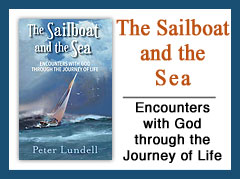 When I approached the Bible as a cocky college student, I did not assume it was true. I was a skeptic. Given all the holy books of other religions, why couldn’t another one be true—or all of them? I checked it out, compared it with other truth claims, and discovered some things:
When I approached the Bible as a cocky college student, I did not assume it was true. I was a skeptic. Given all the holy books of other religions, why couldn’t another one be true—or all of them? I checked it out, compared it with other truth claims, and discovered some things:
Creation
Whether you believe in a young earth or old earth creation view, or in no view at all, one thing is true: Each one of the six days of creation, as described in the book of Genesis, from the point of view of the earth’s surface, as indicated in 1:2, is entirely compatible with what would have been seen through the geological time periods that science describes. There is little conflict between science and the Bible. No other holy book even attempts to describe creation. And the odds that Moses, the author of Genesis, could have written such an accurate creation account by chance are estimated at one in six billion.
Archeology
Liberal theologians once seemed to take delight in pointing out the lack of extra-biblical evidence of people and places in the Bible. They often stated that this city never existed or that king and his battle was a fairy tale. But as archeologists uncovered more and more dirt in Israel and throughout the Middle East, evidence of biblical people and places was found—more every year. And it’s still being found. No other holy book has anywhere near the amount of archeological evidence that the Bible does.
Texts
In examining the reliability of the Bible, we can compare it to other ancient texts. The next most copied text was Homer’s Iliad, which is known to have 640 copies. Among them is a 5 percent textual variance. By contrast the New Testament, a much longer text, is known to have 24,000 copies. But among them is only a 0.5% textual variance. That’s thirty-seven times as many copies but with one-tenth the variance. Incredible. So, whether I want to believe the Bible or not, I can hardly escape the probability that it’s true to it’s original sources and that what it says is really what it said from the beginning.
Prophecies
Depending on how you count, the Old Testament contains approximately fifty prophecies of the coming Messiah, who, what, when, where; his birth, life, death, resurrection—all that stuff. And there are many more verses that imply these same things. The statistical probability that these things could have all come true by chance is as impossible, or more, than Moses’ writing an accurate creation account by chance. I’m waiting to see how the end-times prophecies play out. They’re more specific and voluminous than any other book dares.
“God Knew” Verses
This one’s just for fun. How could anyone thousands of years B.C. know about the water cycle. It wasn’t understood until the 1600s. Yet Job 36:27–28 describes it. Until the 1490s people thought the world was flat. Yet six to seven hundred years B.C. Isaiah wrote of the “circle of the earth” (40:22). The only reason he didn’t say “sphere” is because Hebrew didn’t have a word for it. Though ancient, the Bible is often ahead of its time.
Depictions of God’s Nature
I read about God’s omnipotence, omnipresence, omniscience, omni-everything, and about the weird thing we call the Trinity, as well as the ways he interacts with his creation to the point of dying for it. I shake my head, because it’s all so different from all the other gods jockeying for position, and it’s not the type of thing I’ve seen people make up. The God of the Bible contrasts depictions in all the other holy books, as well as depictions of gods from classical to contemporary literature and entertainment. The unique and unearthly strangeness of God, as expressed in the Bible, is itself a validating factor.
Honesty with Itself
The Bible is the most brutally, embarrassingly honest holy book around—both with its characters and with us. I haven’t found any other holy book that reveals the dirt on its heroes the way the Bible does. It seems the only person in the whole Bible who comes off without fault is Jesus himself. The other books give us carefully guarded depictions of how wonderful their heroes and founders were.
Honesty with Humanity
The Bible is the only holy book that recognizes the seriousness of the mess human beings have gotten themselves in. Primarily I’m talking about sin, separation from God, and the consequences. I conclude this is why it’s the only holy book that does not offer us any kind of do-it-yourself solution to attain redemption and a positive afterlife. It alone recognizes that our situation is greater than what we can overcome ourselves. We need salvation that is beyond what we can earn.
Personal
On a personal side, the Bible is more than a trustworthy book. I have experienced the ways in which it connects believers with the power of God, and experienced much answered prayer and the truth of biblical promises for healing, provision, guidance, and God’s faithfulness. You can too, if you haven’t already.
—-
Photo credit: J. Mark Bertrand www.flickr.com/photos/jmarkbertrand/2345973962/







